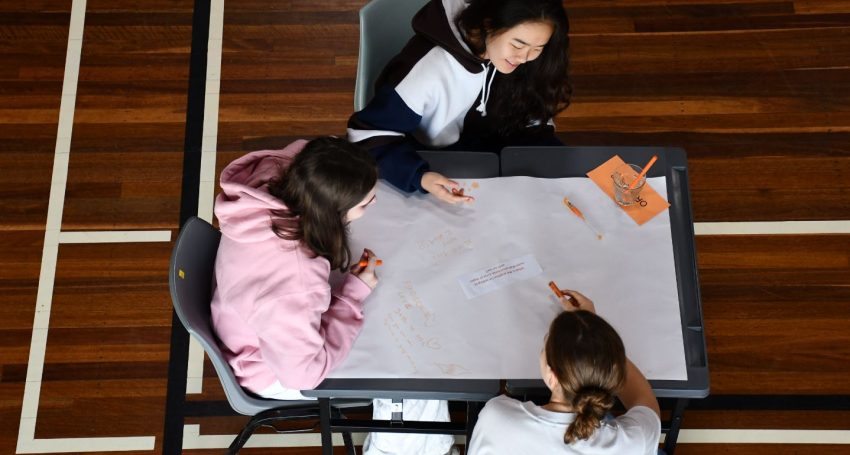World Café at school
Features
“Dialogical tools such as World Café are really helpful in introducing students to ways of talking about serious topics, and for managing conversations where there may be different, strongly-held opinions,” says The Rev’d Gillian Moses from St Aidan’s Anglican Girls’ School

Earlier this year, as part of an RE program with Year 10, I decided to hold a World Café style event as a way of encouraging dialogue and communication. The whole program was designed around questions of Identity, Context and Purpose, and the World Café session fit admirably into the Context part of the plan.
World Café is one dialogue tool that is worth considering for a school setting. It enables the organiser to mix up students into unexpected groups, and to lead them into questions they may never have considered. For our session, I set up our assembly space with café style tables and four chairs, complete with butcher’s paper tablecloths, and bouquets of colour coded writing implements. Each table came with its own question and participants were encouraged to write their answers, questions, ponderings and doodles on the tablecloth, where they could be read by subsequent groups.
Advertisement
After three rounds of questions, with groups switching tables each round, students had engaged collectively with around 24 questions about commitment, possibility, ownership, dissent and gifts. They had pondered the stories they tell about the school and themselves, shared what others in the room have done for them, asked themselves what they have said “yes” to that they really wanted to say “no” to, and thought about the risks they are willing to take for themselves and for the group.
Some of the questions generated great energy and conversation, while others clearly stumped the students. There was a lot of doodling. As with any method of encouraging dialogue, outcomes are less important than processes. Learning that it is okay and possible to talk seriously and to disagree, and to learn more about someone else through this experience, is the real outcome.
Dialogical tools such as World Café are really helpful in introducing students to ways of talking about serious topics, and for managing conversations where there may be different, strongly-held opinions. While we often hear that social media has dumbed down conversation and polarised opinions, I am interested in how we can equip students and staff differently, giving them a bigger and more nuanced toolbox for talking about the things that matter to them. Talking Circles, Open Space and World Café are all methods I have used with success, although they are not the only ones available to us.
There are many resources for hosting World Café available online, including at the World Café website and many opportunities for introducing this concept in schools, with both students and staff. We are looking forward to inviting staff to answer some of the same questions the students did at a future staff day.
First published on the A Place for Mission Anglican schools blog on 18 July 2022.





